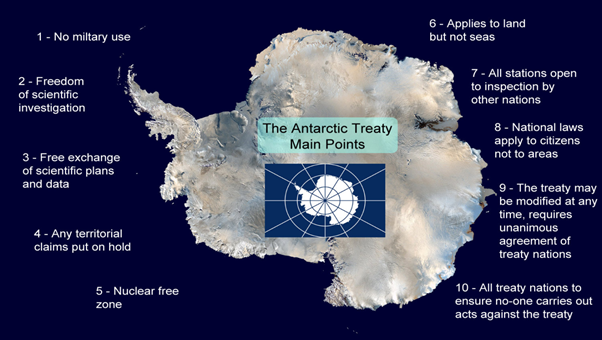

23th July 2022 (7 Topics)
Context
As the mandate under India as a signatory to the Antarctic Treaty of 1963, there were no amendments to the text of the Bill that was earlier passed after a voice vote and again passed in Lok Sabha.
- It is set to become the first domestic legislation with regard to Antarctica in India.
About
- The Bill seeks to give effect to the Antarctic Treaty.
- The Bill aims to lay down a set of rules to regulate a range of activities on territories in Antarctica where India has set up research stations.
Antarctic Treaty
- The Treaty was signed in 1959 by 12 countries.
- It was implemented in 1961, and India became a signatory to it in 1983.
|
Following its first expedition to Antarctica in 1982, India has now established two standing research stations, Bharati and Maitri, at Antarctica. |
What does the Antarctic Bill envisage?
- Regular Visits-The Bill envisages regulating visits and activities to Antarctica as well as potential disputes that may arise among those present on the continent.
- Prohibition without a permit- If the Bill were to become law, private tours and expeditions to Antarctica would be prohibited without a permit or the written authorisation by a member country. A member country is one of the 54 signatories of the Antarctic Treaty signed in 1959 — India joined the Treaty System in 1983.
- Antarctic fund-The draft also directs the creation of a fund called the Antarctic fund that will be used for protecting the Antarctic environment.

Why was this Bill necessary?
- Preserving the pristine environment-There is growing concern over preserving the pristine Antarctic environment and ocean around Antarctica from exploitation of marine living resources and human presence in Antarctica.
- Growing presence of Indian scientists-The continuing and growing presence of Indian scientists in Antarctica warrants a domestic legislation on Antarctica consistent with its obligations as a member of the Antarctic Treaty.
- Increasing Tourism-India organises regular Antarctic expeditions and many persons from India visit Antarctica every year as tourists. In the future, the private ship and aviation industry will also start operations and promote tourism and fishing in Antarctica, which needs to be regulated.
What is the history of the Antarctic Treaty?
- Formation-The Antarctic Treaty came into force on June 23, 1961 after ratification by the 12 countries then active in Antarctic science.
- Key Objective-Its key objectives are to demilitarise Antarctica, to establish it as a zone free of nuclear tests and the disposal of radioactive waste, and to ensure that it is used for peaceful purposes only; to promote international scientific cooperation in Antarctica and to set aside disputes over territorial sovereignty.
- Purpose-These, together with the original Treaty, provide the rules which govern activities in the Antarctic. Collectively they are known as the Antarctic Treaty System (ATS).


